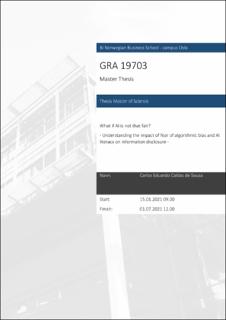| dc.description.abstract | Boosted by the COVID-19 pandemic, the use of AI technology to collect personal
information regarding the population's health has been gaining traction globally.
Public authorities worldwide pinned their hopes on developing disease contacttracing
apps to quickly identify and notify people who have come into contact with
infected individuals. However, population engagement did not work as expected.
Whereas some countries registered a moderate adoption in others, the adherence
was shallow. Inspired by this discrepancy between nations, this thesis investigates
the effect of fear that the algorithm may be inaccurate, reproduce bias and harm
people (fear of algorithmic bias) on willingness to disclose information via an AI
system. Based on risk perception and folk perception of algorithms' literature, this
study hypothesises that the individuals' understanding and knowledge of AI
technology and the nature of the organisation holding the data in interaction with
socioeconomic conditions impact their disclosure intention. Data from an online
experiment in Qualtrics with 800 adults living in high-income countries (400) and
low-income countries (400) were analysed using between-subjects ANOVA, linear
regressions, moderation and mediation with PROCESS, and GLM analysis. This
study found strong evidence that willingness to disclose information decreases as
the fear of algorithmic bias increases. This work also found statistical evidence of
the mediating role of privacy concerns and the moderating role of trust in
government. The results suggest that one way for policymakers to increase the
acceptance of AI is to improve governance over data input in large databases to
mitigate individuals' fear that the algorithms are not properly functioning. | en_US |
